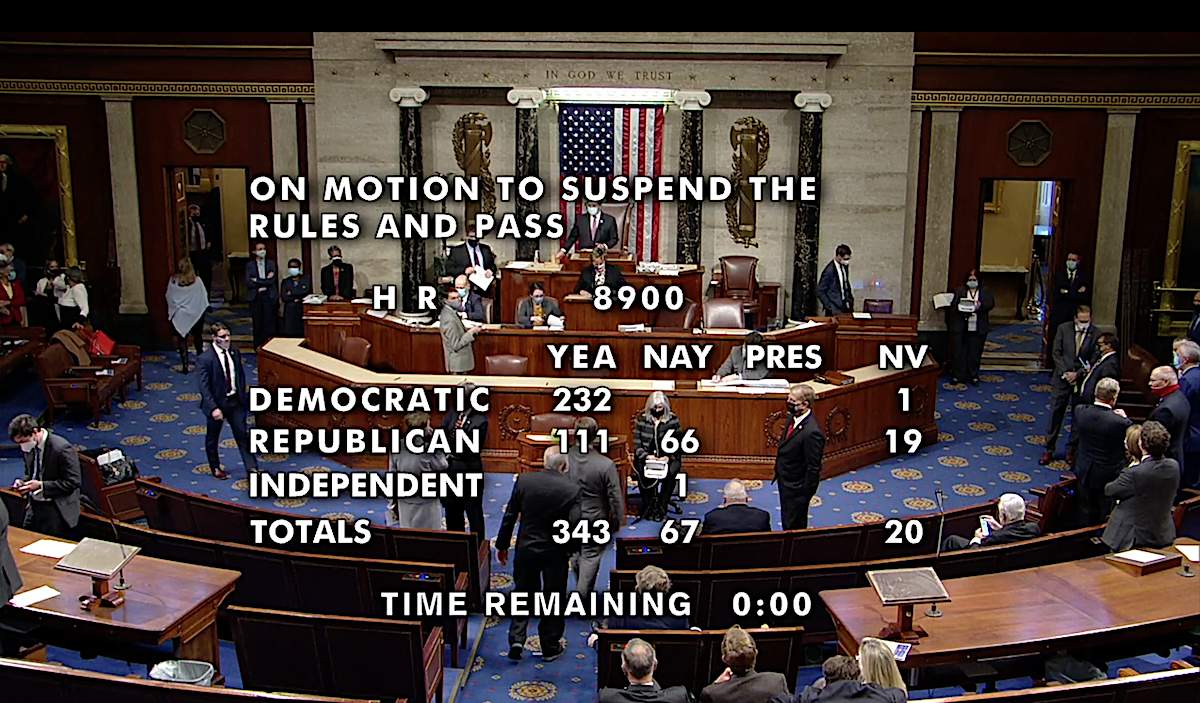
WASHINGTON — The House on Wednesday voted to pass a stopgap spending bill, preventing a government shutdown and giving a group of bipartisan lawmakers another week to negotiate a coronavirus relief package.
In an overwhelming 343-67 vote, House members backed the stopgap, which would extend fiscal 2021 funding until Dec. 18 while talks continue on the stalled relief package.
Georgia’s House members either voted in favor or didn’t vote, except for Monroe Republican U.S. Rep. Jody Hice who Roll Call reports voted against it. Atlanta Democratic U.S. Rep. Kwanza Hall, just sworn in to serve the remainder of the year to complete the term of the late Rep. John Lewis, cast his first significant vote as a House member.
The Senate is expected to take up the stopgap bill Thursday.
Without the stopgap, government funding would expire on Friday. Congress and the Trump administration remain unable to agree on a separate relief plan that would potentially include aid to state and local governments, an extension of unemployment benefits, stimulus checks, funds for state vaccine distribution and a continued moratorium on evictions.
“In addition to an omnibus appropriations bill, it is my hope that this additional week will allow negotiators the time to assemble an emergency coronavirus relief package,” House Appropriations Committee Chair-designate Rosa DeLauro, (D-Conn.), said in a statement.
As the pandemic has raged this year, more than 286,000 Americans have died, and more than 15 million have tested positive for COVID-19. More than 10.7 million people have filed for unemployment and Atlanta’s Centers for Disease Control and Prevention placed an eviction memorandum until the end of the year as people have struggled to pay their rent and mortgages.
House Majority Leader Steny Hoyer, a Maryland Democrat, called the stopgap, known as a continuing resolution, “an admission of failure,” and blamed the Senate for not passing its own appropriations bills earlier, which caused delays in the House.
“It is a function of procrastination, a function of failing to come together and making compromises,” he said on the House floor. “That’s what this body is about, all these chairs here. We have to come to agreement.”
Rep. Cindy Axne, an Iowa Democrat, also criticized the passing of the continued resolution.
“A government shutdown in the middle of a pandemic would be unacceptable, but continuing to do the bare minimum to keep our government running does little to restore faith in this process,” she said in a statement.
A bipartisan group in the House and Senate is hoping to attach its $908 billion coronavirus relief proposal to an omnibus government spending bill. Their plan would fall short of what House Democrats pushed earlier, but would provide unemployment benefits, state and local funding and billions for small businesses.
“That would be our hope because that is the vehicle leaving the station,” House Speaker Nancy Pelosi, (D-Calif.), said during a news conference Friday.
Senate Majority Leader Mitch McConnell slammed Democrats during a Senate floor speech Wednesday, arguing that Republicans made Democrats multiple offers for another relief package. McConnell had offered to give up on provisions shielding businesses from liability due to the pandemic if Democrats would give up on state and local funding.
“Every turn they’ve delayed, deflected, moved the goalpost, and made the huge number of places where Congress agrees into a hostage, into a hostage for the few places where we do not agree,” the Kentucky Republican said.
The last coronavirus relief package passed by the House in May topped more than $3 trillion and provided $1,200 stimulus checks to individuals, $500 billion to states, $20 billion to tribes and $375 billion to local governments.
The proposal that Senate Republicans such as Susan Collins of Maine and Bill Cassidy of Louisiana and Senate Democrats Mark Warner of Virginia and Joe Manchin of West Virginia unveiled last week included $160 billion in funding for state and local governments, $82 billion for education and $45 billion for transportation. The package also provides $7 billion for states to test and trace possible outbreaks.
If passed, that relief package would last until March 31.
However, there is no bill text for that proposal, even as the Christmas recess approaches and special unemployment benefit programs are about to expire.
Sen. John Cornyn, a Texas Republican, said to a group of reporters on Capitol Hill Wednesday that it’s unlikely that the bipartisan group will be able to pass a separate bill for coronavirus relief and that any relief has to be added to the omnibus spending bill.
“It will be part of the omnibus if it’s there at all,” he said, according to pool reports. “And so it’s probably not going to be as expansive as many of us would like.”
Sens. Chris Van Hollen and Ben Cardin, Democrats of Maryland, along with other Maryland lawmakers, are also pushing for the coronavirus relief bill to include at least $32 billion in funding for regional transit systems. The push comes after the Washington Metropolitan Area Transit Authority released its budget proposal for next year that would lay off 2,400 employees due to budget cuts.
“WMATA is not an outlier – their proposal is yet another example of the type of cost-cutting measures that transit agencies across the country have to undertake without additional funds from Congress,” the lawmakers wrote in a Tuesday letter to Pelosi and McConnell.
This article appears in partnership with Georgia Recorder






